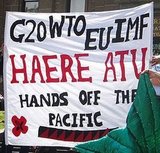
2009-06-16
Trials of the three remaining arrestees from the anti-G20 demonstrations in Melbourne 2006 will begin on June 30 at the Melbourne Magistrate's Court. We urge people to come to Melbourne to show their support and political solidarity to the arrestees. These trials do not mark the first of such kind, but more importantly, they do not mark the last. We need to build a strong culture of providing meaningful political solidarity to those targeted by the state.

About the trials
The first person to face court is a mother from Melbourne – all the prosecution are saying she did was wave a flag and yell, and she is fighting riot charges, as well as charges of affray and criminal damage. Her trial begins on June 30.
On July 13 two men from Sydney go to trial. They are facing charges of aggravated burglary, which can carry a 25 year jail term, for allegedly walking into offices on ‘Corporate Engagement Day’ with nothing more than glitter and water pistols.
One of them then has another trial after that for allegations of assaulting police.
All of these trials will be in front of a jury in Melbourne Magistrates Court.
What were the G20 protests?
In November 2006 the G20 (the finance ministers from the 20 richest countries) met in Melbourne. Protests against them began on Friday with ‘corporate engagement day,’ which targeted offices including defence force recruiting, a company called Tenix, which is a military contractor, and branches of ANZ bank, which is profiteering from the occupation of Iraq.
The next day thousands of people defied police intimidation to protest in the streets of central Melbourne for a variety of reasons, including opposition to the wars in Iraq and Afghanistan and to the neoliberal agenda being pushed in the Pacific through agreements like PACER. A few hundred people diverged from the rally, ran around a bit, dismantled some barricades and smashed the windows of a police van.
Arrests began the next day. All up 28 people were charged. One person, Akin Sari, is currently in jail serving a 28-month sentence. Most of the other arrestees pleaded guilty to reduced charges and got fines, suspended sentences and/ or community based orders.
Regardless of your opinion of the protests, it is important to realise that the police response and the severe charges given were unprecedented and out of all proportion. It was an attempt to isolate and intimidate people and discourage political activity.
Solidarity
With people coming together for the trials, we want to take the opportunity to talk to one another. One afternoon on the weekend of July 18th and 19th, there will be a discussion about developing and improving a culture of political solidarity in the face of state repression, using the current example arising post-G20 2006. Following this, a similar discussion will happen in Sydney during August. The dates and locations are yet to be finalised: please contact us for more information.
Please come to support people in the courtroom if you can. If you have money, please donate to the solidarity fund so we have money if it’s needed for legal and other support costs.
These political prosecutions are part of a much broader attack – and their outcomes, and how we deal with them, will affect all of our abilities to act on our opposition, whatever tactics we use.
For more information email: afterg20@gmail.com or call Lou on 0413 556 590.
To donate to the solidarity fund:
Melbourne University Credit Union Limited
Account name: G20 Arrestee Solidarity Network
cuscau2sxxx (only if transferring from overseas)
BSB 803-143 A/C number: 13291 (all transfers)